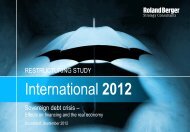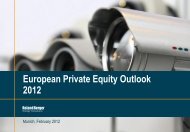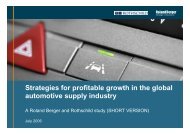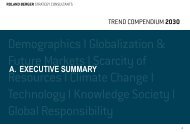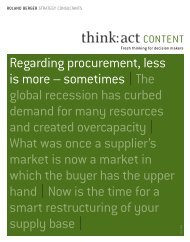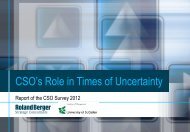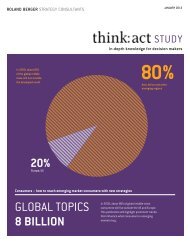issue 1 - Roland Berger
issue 1 - Roland Berger
issue 1 - Roland Berger
Create successful ePaper yourself
Turn your PDF publications into a flip-book with our unique Google optimized e-Paper software.
the profit-revenue ratio is 18 percent higher at ethically managed companies<br />
food for thought f<br />
Generating profit ethically<br />
Companies that link management and ethics generate greater profits in the long run, according to<br />
findings from US government adviser, David Steiner. He is convinced that Europe is currently poised<br />
to take a leading role in developing a comprehensive model for ethical standards.<br />
:<br />
When David Steiner wants to explain<br />
how transparency is created, his job at<br />
British merchant bank SG Warburg comes<br />
to mind: “It was the first bank to open all<br />
incoming mail centrally and make it available<br />
to all employees in an abbreviated<br />
form.” This rigorous transparency model<br />
left its mark on the American ethicist. “I<br />
learned my first lesson in business ethics at<br />
SG Warburg,” he says.<br />
These days, the Institute for Corporate Cultural<br />
Affairs (ICCA) in Frankfurt, Germany<br />
is profiting from Steiner’s experience. Its job<br />
is to encourage companies to think about<br />
social and environmental <strong>issue</strong>s. The need<br />
for them to do so is pressing: As the influence<br />
of state and religion on society wanes, companies<br />
are being called on to fill the gap.<br />
But instead of chiding companies, the ICCA<br />
plays up the benefits of good corporate citizenship.<br />
“We can prove that compliance<br />
with ethical standards has a positive impact<br />
on performance,” says Steiner.<br />
For example, the Dow Jones Sustainability<br />
Indexes (DJSI), which list sustainably operated<br />
companies, beat the MSCI World Index<br />
by 42 points between December 1993 and<br />
September 2004. Likewise, the powerful US<br />
pension fund CalPERS invested $700 million<br />
in companies committed to protecting the<br />
environment and posted gains for its efforts.<br />
In September, the ICCA met with experts<br />
and executives like Rolf-Ernst Breuer, former<br />
chairman of Germany’s Deutsche Bank,<br />
and Richard Edelman, CEO of Edelman<br />
Public Relations Worldwide, to talk about<br />
the corporate code of conduct. “The first<br />
companies are expected to sign up to the<br />
code of conduct as early as 2005,” he says.<br />
The ICCA is also developing an “Ethics Standard<br />
of Excellence” to define the highest<br />
possible level of social responsibility for<br />
international companies, with a role that<br />
extends beyond their usual areas of operation.<br />
Says Steiner: “This is a process in<br />
which Europe, with the help of the ICCA,<br />
can take a leading role.” The ICCA wants to<br />
serve as a think tank in this context and<br />
channel the ethical efforts of corporate<br />
groups. It also wants to create an award for<br />
ethical corporate governance.<br />
Of course, senior managers may be hesitant<br />
to introduce moral and social standards out<br />
of fear of diluting shareholder value. Steiner<br />
reassures them: “The interests of shareholders<br />
are a priority for us as well. But we want<br />
to prove that companies can both satisfy<br />
DAVID M. STEINER is a professor at Boston<br />
University and department chairman of the School<br />
of Education. On behalf of the Institute for Corporate<br />
Cultural Affairs (ICCA), he is studying <strong>issue</strong>s<br />
relating to ethical corporate leadership and social<br />
responsibility. Steiner, who studied philosophy and<br />
ethics in Oxford, England, and earned his Ph.D. at<br />
Harvard University, is a recognized expert in the<br />
fields of ethics and education. He has been serving<br />
as director of the National Endowment for the Arts<br />
in Washington, DC since June 2004. This government<br />
organization’s purpose is to strengthen the<br />
role of the arts in culture and education.<br />
shareholder expectations and serve the<br />
community at the same time.”<br />
Steiner’s argument is backed by Simone<br />
Webley and Elise More. Working for the Institute<br />
of Business Ethics, in Britain, these<br />
two researchers have discovered that ethically<br />
managed companies generate 18 percent<br />
higher profits than their competitors.<br />
Moreover, these companies present a less<br />
volatile price-to-earnings ratio and are able<br />
to increase their return on capital employed<br />
(ROCE) by approximately 50 percent, while<br />
LACK OF TRANSPARENCY AND<br />
ETHICAL AMBIVALENCE CAN<br />
BE VERY COSTLY<br />
this value actually fell for companies without<br />
a code of conduct.<br />
The equation also works the other way<br />
around, because those who take an active<br />
approach to acknowledging and tackling<br />
mistakes generally suffer no loss in sales.<br />
“Lack of transparency and ethical ambivalence<br />
are more expensive than simply<br />
telling the truth,” says Steiner. The biggest<br />
obstacle to introducing new standards is the<br />
gap between short- and long-term expectations.<br />
Says Steiner, “It’s true that ethical<br />
management involves considerable costs up<br />
front, but these more than balance out in<br />
the long run.”<br />
The code of conduct currently being discussed<br />
by the ICCA forbids fraud and discrimination,<br />
promotes transparency and<br />
cultural diversity, and requires companies<br />
think: act 15



